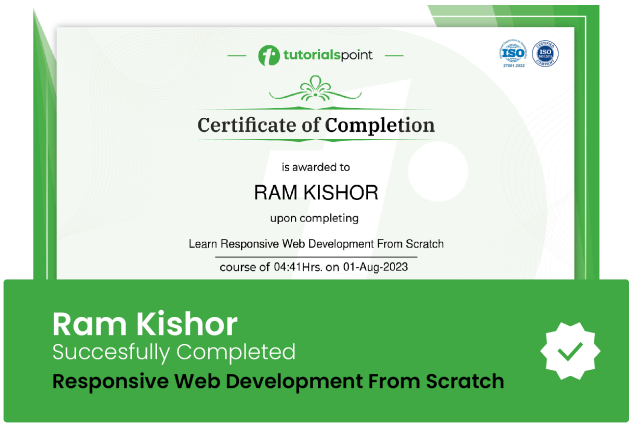PSS/E for Power Systems & Python Automation
The "abc" of modeling and automation of power systems from scratch in PSS/E

Lectures -29
Duration -2.5 hours

30-days Money-Back Guarantee
Get your team access to 10000+ top Tutorials Point courses anytime, anywhere.
Course Description
Unlock the potential of PSS/E (Power System Simulator for Engineering) in conjunction with Python automation to delve into the dynamic world of power systems and renewable energy. This comprehensive course is designed for aspiring engineers, energy professionals, and enthusiasts seeking hands-on experience in building and optimizing entire power systems.
Key Highlights:
Master PSS/E Fundamentals:\r\nDive into the core principles of PSS/E, gaining a deep understanding of power system modeling, analysis, and simulation. Learn to create detailed models of transmission networks, generators, and other essential components.
Renewable Energy Integration:\r\nExplore the intricacies of incorporating renewable energy sources such as wind, solar, and hydropower into your power systems. Understand the challenges and solutions associated with the integration of clean energy to achieve a sustainable and resilient power infrastructure.
Python Automation for Power Systems:\r\nHarness the power of Python for automating tasks, optimizing simulations, and streamlining complex analyses within the PSS/E environment. Develop practical coding skills to enhance efficiency in power system design and operation.
Hands-On Project Development:\r\nApply your knowledge through hands-on projects that guide you in building entire power systems from scratch. Implement real-world scenarios, troubleshoot issues, and optimize your systems using the tools and techniques acquired throughout the course.
Grid Stability and Reliability:\r\nDelve into the critical aspects of grid stability and reliability. Learn to identify potential challenges, design resilient systems, and employ advanced simulation techniques to ensure the smooth operation of power networks under various conditions.
Optimization Techniques:\r\nUtilize optimization algorithms and methodologies to enhance the performance and efficiency of your power systems. Understand how to balance conflicting objectives, maximize energy output, and minimize environmental impact through intelligent system design.
Industry-Relevant Insights:\r\nBenefit from real-world insights and case studies shared by industry experts. Understand the current trends, challenges, and opportunities in the rapidly evolving field of power systems and renewable energy.
Community and Networking:\r\nJoin a vibrant community of like-minded learners and professionals. Engage in discussions, share your experiences, and collaborate on projects to broaden your understanding of power systems and automation.
By the end of this course, you will not only have a profound grasp of PSS/E and Python automation but also the skills to design, analyze, and optimize comprehensive power systems, laying the foundation for a successful career in the dynamic field of renewable energy and power engineering. Are you ready to embark on a journey to shape the future of sustainable energy? Enroll now!
Goals
What will you learn in this course:
Comprehensive PSS/E Proficiency: Gain mastery over the Power System Simulator for Engineering (PSS/E) by developing a thorough understanding of its features, tools, and capabilities. Acquire the skills to model and simulate diverse components of power systems with precision.
Renewable Energy Integration Skills: Learn how to seamlessly integrate renewable energy sources into power systems. Understand the unique challenges and solutions associated with wind, solar, and hydropower integration, contributing to the development of sustainable energy solutions.
Python Automation Expertise: Develop practical coding skills in Python specifically tailored for power system automation. Learn to script repetitive tasks, automate simulations, and optimize analyses within the PSS/E environment, enhancing efficiency and reducing manual workload.
Hands-On Project Implementation: Apply theoretical knowledge through hands-on projects that guide you in constructing entire power systems. Implement real-world scenarios, troubleshoot issues, and optimize systems to reinforce your understanding and practical skills.
Grid Stability and Reliability Mastery: Explore the intricacies of grid stability and reliability. Acquire the skills to design power systems that can withstand varying conditions and maintain operational stability. Utilize advanced simulation techniques to analyze and enhance system reliability.
Optimization Techniques Application: Implement optimization algorithms and methodologies to enhance the performance of power systems. Learn to balance conflicting objectives, maximize energy output, and minimize environmental impact through intelligent system design and operation.
Industry-Ready Insights: Acquire insights into industry trends, challenges, and opportunities from real-world case studies and expert discussions. Develop a practical understanding of the current landscape in power systems and renewable energy to align your skills with industry needs.
Effective Collaboration and Communication: Enhance your ability to collaborate with peers through community engagement and project collaboration. Develop communication skills to effectively convey complex ideas and solutions related to power systems and automation.
Problem-Solving and Troubleshooting: Cultivate problem-solving skills by addressing challenges encountered during the course projects. Learn to troubleshoot issues in power system modeling, Python automation, and system optimization to develop resilience in tackling real-world problems.
Career Readiness: Be prepared for a successful career in the field of renewable energy and power engineering. Develop a portfolio of projects showcasing your skills, and gain the confidence to apply your knowledge in professional settings.
This course is designed to equip you with the essential skills, knowledge, and practical experience needed to navigate the complexities of power systems, automation, and renewable energy, positioning you for success in a rapidly evolving industry.
Prerequisites
What are the prerequisites for this course?
Foundational Knowledge in Power Systems:\\r\\nA basic understanding of power systems, including concepts such as electrical circuits, transmission lines, generators, and transformers, is recommended. Familiarity with fundamental power engineering principles will provide a solid foundation for advanced topics covered in the course.
Programming Basics (Python):\\r\\nBasic programming skills in Python are essential for the automation aspects of the course. Familiarity with Python syntax, data structures, and simple scripting will enable a smoother transition to the automation and optimization components of the curriculum.
Mathematics and Numerical Methods:\\r\\nProficiency in mathematics, including algebra, calculus, and numerical methods, is beneficial. The course involves mathematical modeling, optimization, and simulation techniques, so a strong foundation in these areas will enhance comprehension and application.
Energy Systems Understanding:\\r\\nA general understanding of energy systems, especially in the context of renewable energy, would be advantageous. Familiarity with the basics of solar, wind, and hydropower systems will help in grasping the integration challenges discussed in the course.
Engineering or Technical Background:\\r\\nWhile not mandatory, a background in engineering or a related technical field is recommended. This course is designed for individuals with a technical mindset, and prior exposure to engineering concepts will aid in the assimilation of more advanced topics.
Basic Understanding of Simulation Software:\\r\\nFamiliarity with simulation software or tools used in engineering, though not mandatory, will be helpful. This could include exposure to modeling and simulation concepts in the context of power systems or other engineering applications.
Curiosity and Enthusiasm:\\r\\nAn eagerness to explore and learn about power systems, renewable energy, and automation is crucial. The course is designed to be engaging and hands-on, and a curious mindset will enhance the overall learning experience.
These prerequisites are intended to ensure that participants have a foundational understanding of the key concepts and skills required for the course. While some flexibility is built into the curriculum to accommodate learners with varying backgrounds, meeting these prerequisites will contribute to a more successful and rewarding learning experience.

Curriculum
Check out the detailed breakdown of what’s inside the course
Introduction & Installation
2 Lectures
-
What is PSS/E 02:46 02:46
-
Installation 04:23 04:23
Basics of PSS/E
6 Lectures

Steady State Studies
6 Lectures

File Definitions in PSS/E
3 Lectures

Dynamic Simulation Studies
5 Lectures

Renewable Energy Simulation
5 Lectures

Python Automation of PSS/E
5 Lectures

Instructor Details

Power 2 Human
eCourse Certificate
Use your certificate to make a career change or to advance in your current career.

Our students work
with the Best


































Related Video Courses
View MoreAnnual Membership
Become a valued member of Tutorials Point and enjoy unlimited access to our vast library of top-rated Video Courses
Subscribe now
Online Certifications
Master prominent technologies at full length and become a valued certified professional.
Explore Now


 Updated on Mar, 2024
Updated on Mar, 2024
 Language - English
Language - English